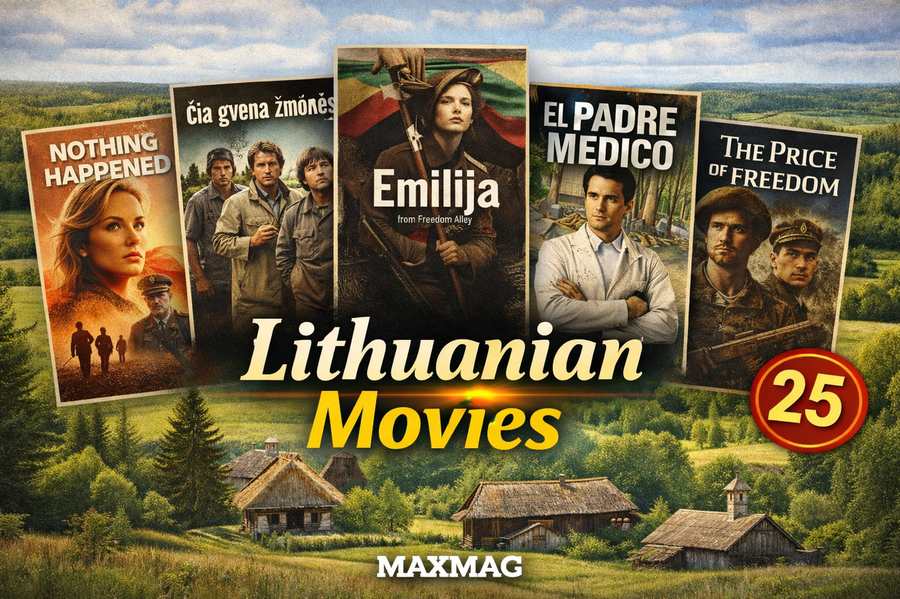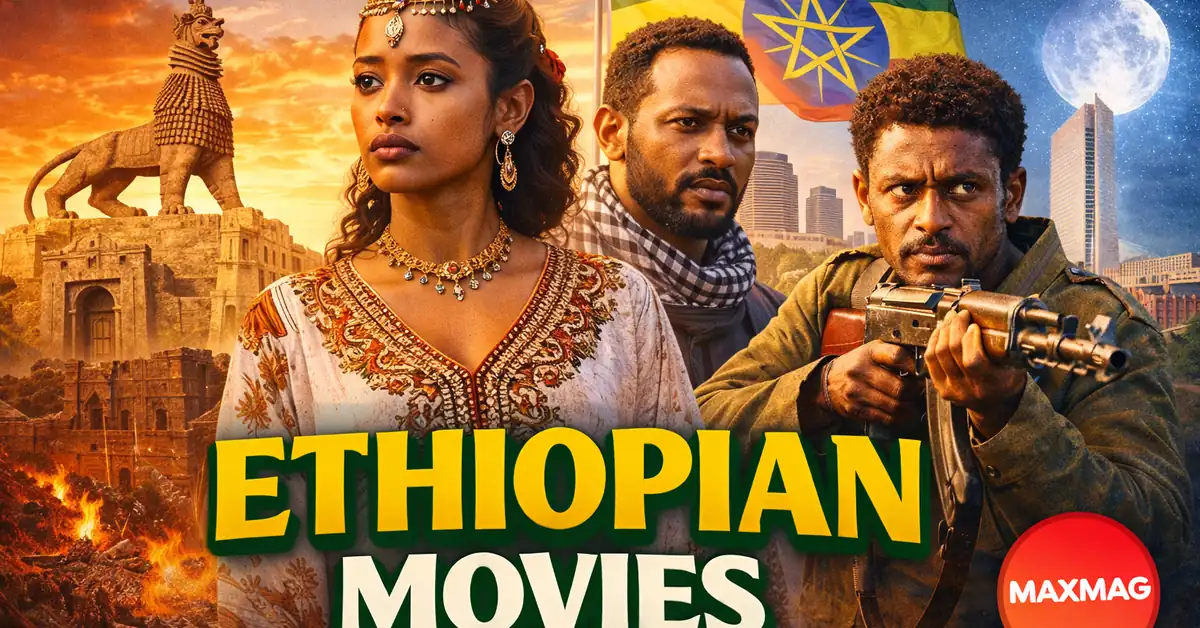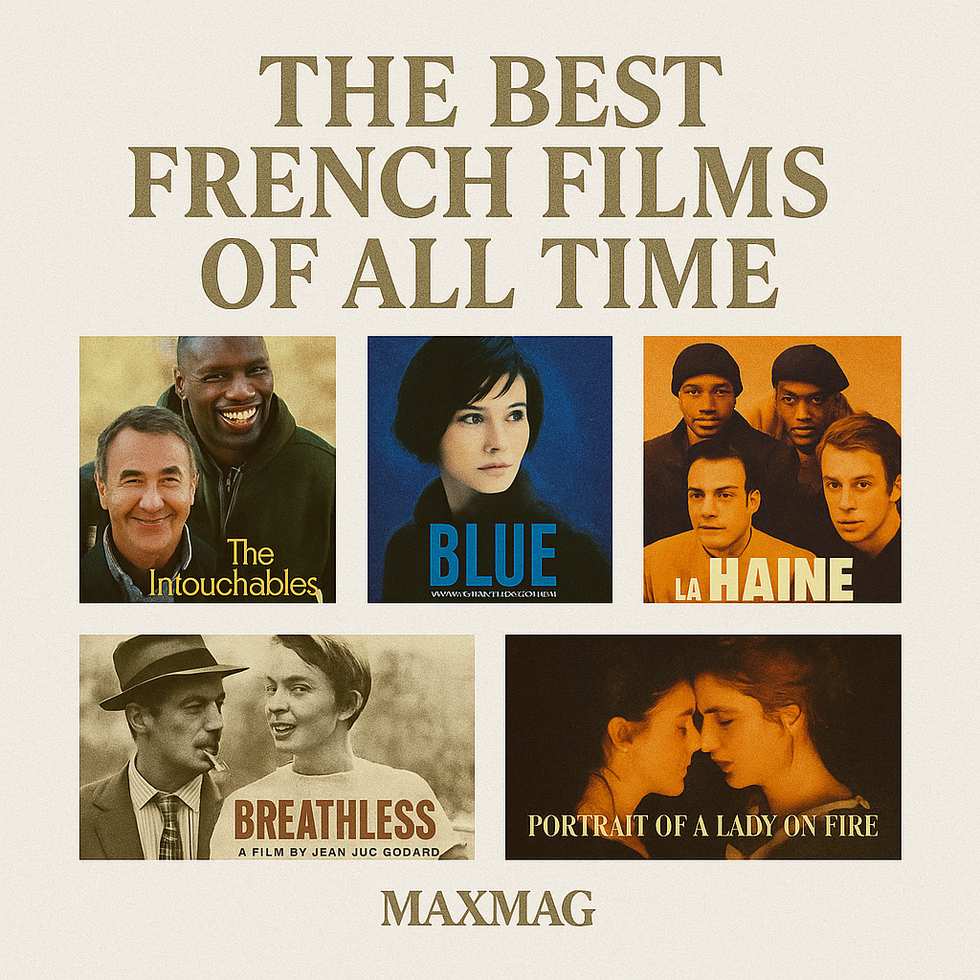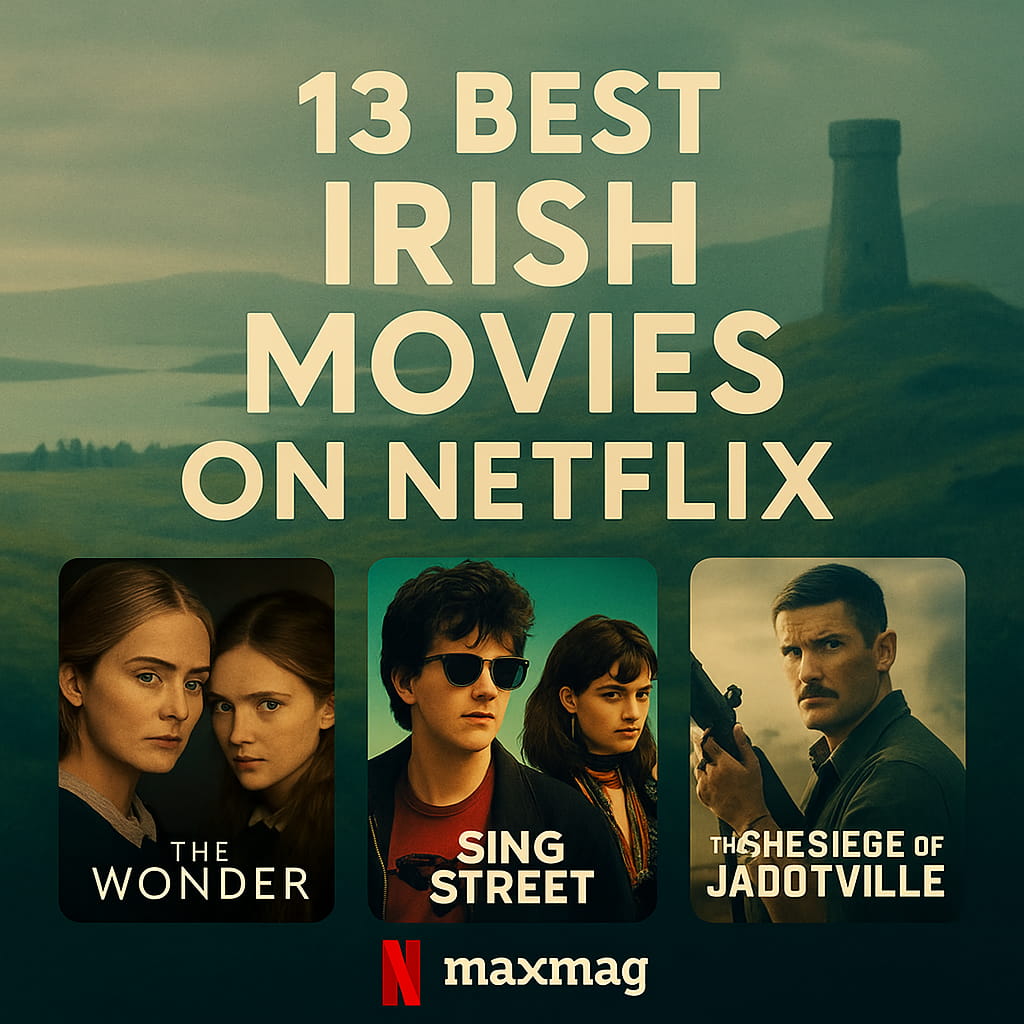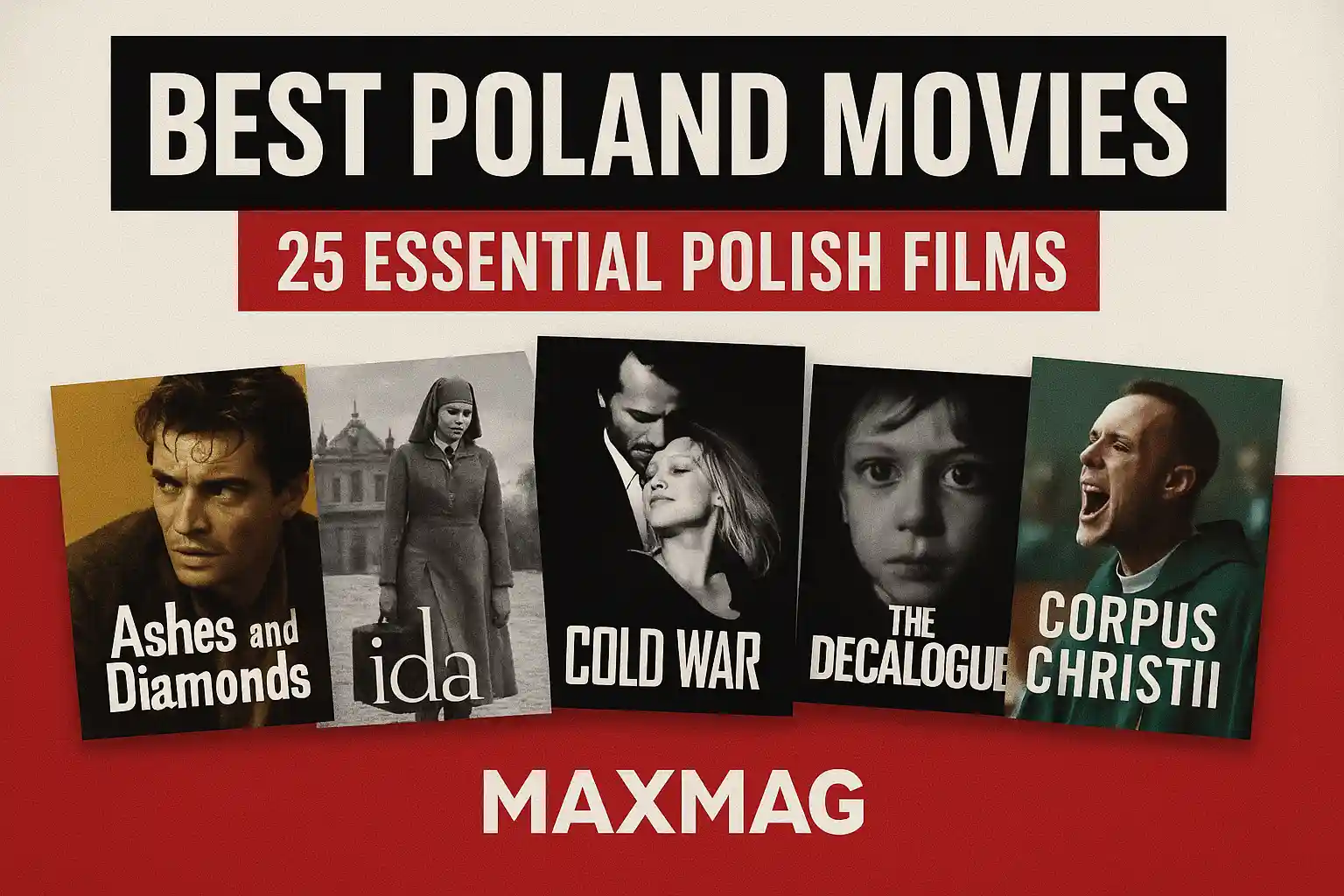
Poland movies—commonly referred to as Polish movies—stand among the most distinctive and influential bodies of work in European cinema. From historical dramas that examine the country’s turbulent past to poetic films that probe identity, morality, and the mysteries of everyday life, this tradition has shaped global film culture for decades. The post-war Polish Film School, the moral explorations of Krzysztof Kieślowski, and contemporary breakthroughs by Paweł Pawlikowski, Agnieszka Holland, and Jan Komasa illustrate a lineage of audacity and craft. The 25 titles below spotlight films that are beautiful, thought-provoking, and emotionally resonant, revealing how creators transformed censorship, scarcity, and upheaval into startlingly inventive art. Whether you’re a newcomer or a seasoned cinephile, these selections will deepen your appreciation for the scope and soul of Poland movies.
1. Ashes and Diamonds (1958)
- Runtime: 103 minutes
- Starring: Zbigniew Cybulski, Ewa Krzyżewska
- Director: Andrzej Wajda
- Genre: War, Drama
- IMDb Rating: 7.8
Wajda’s landmark drama unfolds on the last day of World War II, when victory feels precarious and peace feels provisional. Zbigniew Cybulski’s charismatic Maciek—often likened to a Polish James Dean—embodies a generation caught between romantic myths of resistance and a new political order that demands compromise. The film’s iconic images—flaming vodka glasses, bullets in the dust, faces trapped in barroom shadows—turn private doubts into public symbols. Beneath the noir shimmer is a piercing meditation on the ethics of assassination, the residue of trauma, and the seduction of youthful bravado. Every choice feels weighted by history, yet Wajda resists didacticism, favoring ambiguity and ache. At once intimate and epic, the film’s final, devastating sequence insists that endings are rarely clean. Few Poland movies have articulated the emotional cost of transition with such elegance, fury, and philosophical grace.
2. The Promised Land (1975)
- Runtime: 179 minutes
- Starring: Daniel Olbrychski, Wojciech Pszoniak, Andrzej Seweryn
- Director: Andrzej Wajda
- Genre: Drama, Historical
- IMDb Rating: 8.0
Wajda’s sweeping adaptation of Reymont’s novel turns industrial Łódź into a fever dream of progress, profit, and peril. Three friends—Polish, German, Jewish—conspire to build a textile empire, but their alliance frays as money exposes fissures of class, ethnicity, and desire. Whirring machines and smoking chimneys create an infernal symphony that both dazzles and indicts, while lavish salons mask ruthless exploitation. The camera roams with operatic energy, yet the drama remains piercingly human, tracking how ambition deforms affection and turns ideals into currency. Without flattening anyone into a villain, the film reveals capitalism’s seductions and casualties with clear-eyed moral force. It stands as one of the grand achievements of Polish movies, a historical fresco whose textures—silk, soot, sweat—linger like the afterimage of a flash.
3. The Deluge (1974)
- Runtime: 315 minutes (full version)
- Starring: Daniel Olbrychski, Małgorzata Braunek, Władysław Hańcza
- Director: Jerzy Hoffman
- Genre: Historical, War, Drama
- IMDb Rating: 7.1
Jerzy Hoffman transforms Sienkiewicz’s classic into a thunderous, romantic epic about Poland’s 17th-century struggle against the Swedish invasion. At its core is Kmicic, a brash nobleman whose rashness curdles into guilt and then into sacrificial courage, mirroring a nation’s fight to reforge itself. Cavalry charges churn up muddy fields; fortresses blaze; loyalties fracture and re-knit under pressure. The scale is monumental, yet the film’s pulse is personal—love, betrayal, repentance—etched in close-ups that compress history into faces. Hoffman refuses empty triumphalism, honoring both patriotic fervor and the price extracted by war. A cultural event for generations of viewers, it proved that Poland movies could match the sweep of any international epic while retaining moral nuance and local texture.
4. Knife in the Water (1962)
- Runtime: 94 minutes
- Starring: Leon Niemczyk, Jolanta Umecka, Zygmunt Malanowicz
- Director: Roman Polanski
- Genre: Drama, Thriller
- IMDb Rating: 7.4
Polanski’s debut isolates a couple and a drifter on a sailboat, turning open water into a laboratory for pride, jealousy, and latent violence. With minimal props and maximal precision, the film builds suspense from glances, gestures, and the unnerving intimacy of shared space. Masculinity becomes a performance that can’t stop auditioning; the titular knife is both toy and totem, a sharp reminder of how quickly games become threats. The natural soundscape—slap of waves, hiss of wind, clink of metal—functions like a score, tightening the coil. Earning Poland’s first Oscar nomination for Best Foreign Language Film, this master class in psychological tension expanded what Polish movies could be: rigorous, modern, and terrifyingly close to the bone.
5. The Hourglass Sanatorium (1973)
- Runtime: 124 minutes
- Starring: Jan Nowicki, Tadeusz Kondrat
- Director: Wojciech Jerzy Has
- Genre: Fantasy, Drama
- IMDb Rating: 7.5
Wojciech Jerzy Has translates Bruno Schulz’s mystic prose into rooms where time refuses to obey, a dream logic as tactile as dust motes in lamplight. A son visits his dying father in a decaying sanatorium that spills into childhood streets, vanished shops, and seasons that overlap like palimpsests. Ornate sets and painterly compositions suggest an archive of memory that is always under restoration and always incomplete. The plot advances like sleep—associative, circular, strangely inevitable—while grief and wonder intertwine. Rather than puzzle-box cleverness, the film offers tenderness for the fragile machinery of recollection. It’s an enduring testament to how Poland movies can treat metaphysics not as abstraction but as a feeling you can walk through.
6. The Saragossa Manuscript (1965)
- Runtime: 182 minutes
- Starring: Zbigniew Cybulski, Iga Cembrzyńska
- Director: Wojciech Jerzy Has
- Genre: Fantasy, Adventure
- IMDb Rating: 8.0
Stories blossom within stories in Has’s exuberant adaptation of Jan Potocki: duels, apparitions, seductions, and riddles pirouette across Spain during the Napoleonic Wars. The film’s nested structure isn’t a gimmick; it’s a philosophy, asking whether truth is mosaic rather than monolith. Sumptuous design and sly humor keep the labyrinth airy, while philosophical detours—free will, fate, belief—sneak up like secret passages. Beloved by cinephiles and artists, the movie demonstrates how Polish movies can be erudite without being dreary, playful without being trivial, and adventurous without losing emotional ballast. It is a cinematic cabinet of curiosities that invites you to get lost and be delighted by the getting.
7. Man of Marble (1977)
- Runtime: 165 minutes
- Starring: Jerzy Radziwiłowicz, Krystyna Janda
- Director: Andrzej Wajda
- Genre: Drama
- IMDb Rating: 7.9
Part detective story, part essay on images, Wajda’s film tracks a determined young documentarian who digs into the 1950s rise and fall of a socialist “model worker.” As she threads together propaganda reels, suppressed testimonies, and bureaucratic evasions, a myth unravels into a wounded human life. The movie’s hybrid form—fiction corroded by documentary textures—mirrors its thesis: that history is edited, spliced, and often dubbed by power. Krystyna Janda’s tenacity makes research feel like rebellion. Few Poland movies interrogate the ethics of representation with such verve, showing how the fight for truth is also a fight over who controls the close-up.
8. Man of Iron (1981)
- Runtime: 153 minutes
- Starring: Jerzy Radziwiłowicz, Krystyna Janda, Lech Wałęsa
- Director: Andrzej Wajda
- Genre: Drama, Political
- IMDb Rating: 7.8
The Palme d’Or–winning sequel to Man of Marble fuses fiction with living history, as the Solidarity movement surges and the shipyards become a stage for national renewal. Real political figures stride through scenes, and the texture of protest—voices, banners, exhausted faces—charges the frame with immediacy. The film honors courage without sanctimony, acknowledging grief, fear, and compromise. It documents a moment when private hopes braided into public action, reminding us that democracy is a verb. Among Polish movies on dissent, few feel this alive to risk or this stubbornly protective of ordinary dignity.
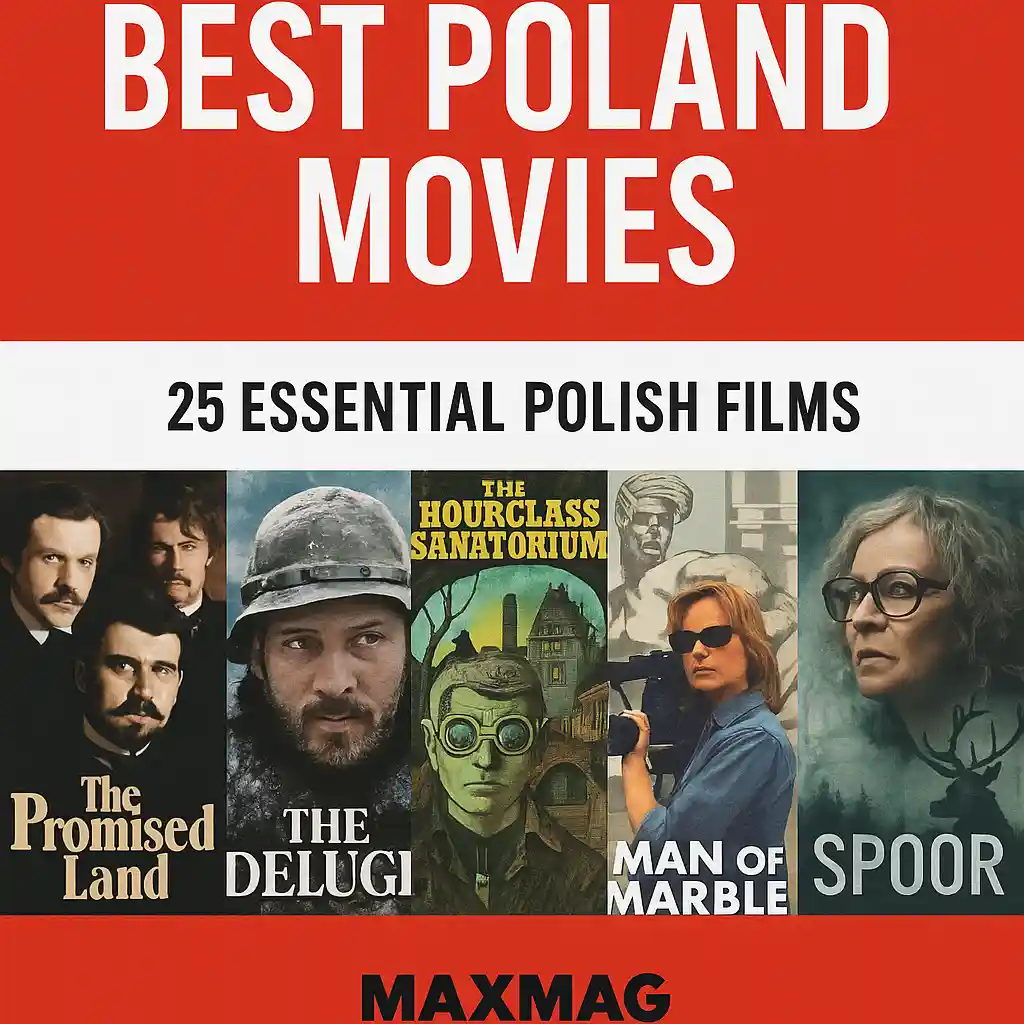
9. The Double Life of Véronique (1991)
- Runtime: 98 minutes
- Starring: Irène Jacob, Władysław Kowalski
- Director: Krzysztof Kieślowski
- Genre: Drama, Fantasy
- IMDb Rating: 7.8
Kieślowski’s luminous fable follows two women—one in Poland, one in France—who never meet and yet feel mysteriously twinned. Sławomir Idziak’s amber-glass cinematography and Zbigniew Preisner’s aching score give the film a tactile hush, like breath on a mirror. Identity here is less a factsheet than a vibration, sensed in music, touch, and déjà vu. Irène Jacob’s performance is tender, alert, and almost telepathic, making silence feel eloquent. Rather than solve its metaphysical puzzle, the movie teaches you how to dwell inside it. In the constellation of Poland movies, it glows—an intimate star whose light arrives softly and stays.
10. The Decalogue (1989)
- Runtime: 10 episodes, ~55 minutes each
- Starring: Krystyna Janda, Daniel Olbrychski, Henryk Baranowski
- Director: Krzysztof Kieślowski
- Genre: Drama, Anthology
- IMDb Rating: 9.1
Ten stories set in a Warsaw housing estate become a cathedral of everyday ethics, each episode refracting one of the Ten Commandments through ordinary people facing impossible choices. Kieślowski’s gaze is compassionate yet unsparing; small errors ripple into heartbreak, and acts of grace arrive without trumpet. The series’ restraint—no grand speeches, no easy villains—amplifies its moral charge. It is cinema as quiet revelation, insisting that the sacred can dwell in kitchens, stairwells, and snow. Revered worldwide, the work influenced generations of filmmakers, securing its place as the summit of Poland movies and a perennial lesson in how art can enlarge conscience.
Poland movies
From historical epics to metaphysical reveries, Poland movies map a culture where national memory and private longing are inseparable. The films above forged the canon; the films below extend and challenge it, opening new paths through biography, war memory, and contemporary moral storms.
11. Ida (2013)
- Runtime: 82 minutes
- Starring: Agata Trzebuchowska, Agata Kulesza
- Director: Paweł Pawlikowski
- Genre: Drama
- IMDb Rating: 7.4
Pawlikowski’s austere, Academy Award–winning drama follows a novice nun who discovers a buried family history before taking her vows. Framed with radical simplicity—faces low in the composition, ceilings heavy as fate—the imagery lets silence carry the freight of grief and complicity. Agata Kulesza’s world-tired aunt, a prosecutor who drinks to remember and to forget, guides Ida across a landscape of absence: unmarked ground, missing names, rooms with corners that seem to listen. The film’s mercy lies in refusing melodrama while honoring hurt. It compresses a nation’s unspoken losses into a pilgrimage of two women whose bond is prickly, tender, and true. As contemporary Polish movies go, few achieve such spiritual clarity with so little adornment.
12. Cold War (2018)
- Runtime: 88 minutes
- Starring: Joanna Kulig, Tomasz Kot
- Director: Paweł Pawlikowski
- Genre: Romance, Drama, Music
- IMDb Rating: 7.5
A love story sung in minor keys, Cold War follows a composer and a singer whose chemistry survives borders, regimes, and self-sabotage. Folk tunes become state spectacle, then smoky jazz; the music tracks how history engineers feelings while lovers keep improvising. Joanna Kulig is incandescent—feral, funny, wounded—her voice turning scenes into arias. The square frame corrals time into perfectly cut glimpses, each shot a small shrine to longing. Nominated for three Oscars, the film reaffirmed the global reach of Poland movies while proving that romance can be both grand and bruisingly precise.
13. In Darkness (2011)
- Runtime: 145 minutes
- Starring: Robert Więckiewicz, Benno Fürmann, Agnieszka Grochowska
- Director: Agnieszka Holland
- Genre: War, Drama
- IMDb Rating: 7.3
Holland’s harrowing, Oscar-nominated drama descends into the sewers of Nazi-occupied Lwów, where a thief-turned-savior hides Jewish families for profit—and then for conscience. The darkness is literal and ethical; bargains are struck, rescinded, remade; survival is a choreography of luck and grit. Refusing sanctimony, the film honors flawed courage and refuses to tidy the terror. When light finally appears, it blinds rather than consoles. Among contemporary Polish movies confronting the Holocaust, In Darkness stands out for its claustrophobic rigor and refusal to let heroism eclipse human mess.
14. Katyn (2007)
- Runtime: 118 minutes
- Starring: Andrzej Chyra, Maja Ostaszewska, Artur Żmijewski
- Director: Andrzej Wajda
- Genre: War, Drama, History
- IMDb Rating: 7.0
Wajda—whose father was among the murdered officers—constructs a sober memorial to the 1940 Katyn massacre and the decades of denial that followed. The film pivots between families waiting for news, officials manufacturing untruth, and a society trying to live while the ledger of the dead remains unbalanced. Its climax is devastating not for shock but for ceremony: names, uniforms, objects that once tethered men to life. Without spectacle, the movie restores specificity to loss. In the canon of Poland movies, it is an ethical keystone, insisting that remembrance is an action, not an afterthought.
15. Aftermath (2012)
- Runtime: 104 minutes
- Starring: Maciej Stuhr, Ireneusz Czop
- Director: Władysław Pasikowski
- Genre: Drama, Thriller
- IMDb Rating: 6.6
Two estranged brothers reunite in a village where an unquiet past pushes through the soil. Pasikowski uses thriller rhythms—cryptic warnings, night raids, rooms that won’t stay locked—to prise open communal memory. The film was controversial for suggesting local complicity in wartime crimes, which is precisely why it matters. It demonstrates that reckoning is not only archival but interpersonal: siblings, neighbors, a town learning how to speak plainly. As a modern entry in Poland movies, it’s bracing proof that genre can carry difficult truths with urgency and care.
16. The Last Family (2016)
- Runtime: 123 minutes
- Starring: Andrzej Seweryn, Dawid Ogrodnik, Aleksandra Konieczna
- Director: Jan P. Matuszyński
- Genre: Biography, Drama
- IMDb Rating: 7.1
Eschewing art-world gloss, this intimate biopic of painter Zdzisław Beksiński watches life accumulate in kitchens, corridors, and taped conversations. Death hovers—illnesses, accidents, dread—but the film insists on dailiness: small jokes, chores, the stubborn warmth of habit. Andrzej Seweryn’s performance is a study in paradox, a man who paints nightmares yet responds to catastrophe with formal courtesy. The movie treats fame as noise offstage; what matters is how people keep or fail one another when the camera is still. Among Polish movies about artists, it is rare for its humility and its faith in the dramatic charge of the ordinary.
17. Snow White and Russian Red (2009)
- Runtime: 110 minutes
- Starring: Borys Szyc, Sonia Bohosiewicz
- Director: Xawery Żuławski
- Genre: Drama, Satire
- IMDb Rating: 5.8
Based on Dorota Masłowska’s cult novel, Żuławski plunges into a post-communist hangover of bravado, drugs, and gendered performance. The style is jittery, vulgar, and strangely tender—like graffiti that won’t stop editing itself. Men posture; women refuse scripts; language itself becomes a dare. The film is divisive by design, a howl against complacency that sees alienation as both wound and shield. As a snapshot of cultural whiplash in Poland movies, it remains a jagged shard that keeps catching light in new angles.
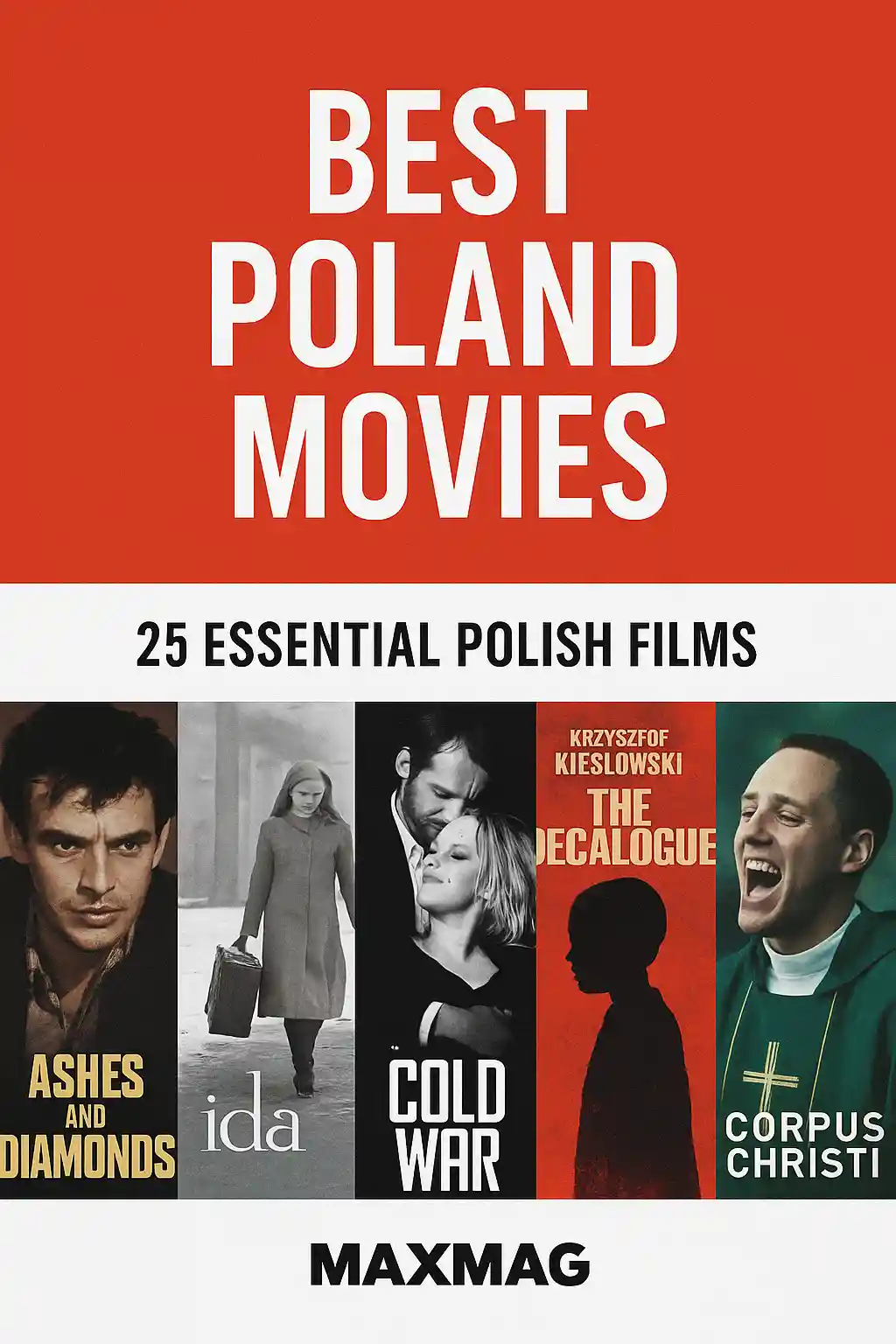
18. Interrogation (1982, released 1989)
- Runtime: 118 minutes
- Starring: Krystyna Janda, Adam Ferency, Janusz Gajos
- Director: Ryszard Bugajski
- Genre: Drama, Political
- IMDb Rating: 8.0
Banned for years, Bugajski’s prison drama emerged like contraband truth. Krystyna Janda plays a cabaret singer swallowed by the state’s paranoid machinery, and her transformation—from bewildered detainee to a person who will not break—unfurls without martyrdom clichés. The film is unblinking but never exploitative, attentive to how systems make collaborators of bystanders and clerks. When audiences finally saw it, the shock was not only in brutality but in recognition: this is how fear is administered. In the history of Poland movies, it is an essential document of courage and a manual for moral weathering.
19. Europa Europa (1990)
- Runtime: 112 minutes
- Starring: Marco Hofschneider, Julie Delpy
- Director: Agnieszka Holland
- Genre: War, Biography, Drama
- IMDb Rating: 7.6
Holland recounts the true story of Solomon Perel, a Jewish boy who survives the war by passing as a German, with tonal daring that moves between absurdity and anguish. Identity becomes a costume that endangers even as it protects; luck keeps confusing itself with wit. The movie refuses to tidy the paradoxes of survival, granting its hero the complexity of a child who learns to improvise in a world that calls improvisation treason. Celebrated internationally, it remains a bridge between Poland movies and global audiences, inviting debate about morality when every rule is rigged.
20. Blind Chance (1987)
- Runtime: 114 minutes
- Starring: Bogusław Linda, Tadeusz Łomnicki
- Director: Krzysztof Kieślowski
- Genre: Drama
- IMDb Rating: 7.8
A missed or caught train splinters a young man’s life into three paths—party loyalist, dissident, believer—allowing Kieślowski to test fate against freedom with analytical tenderness. The conceit feels less like a trick than a moral instrument: we watch institutions recruit, disappoint, and reshape the same soul under different pressures. Censors balked, then the film returned as a classic, prophetic of the director’s later metaphysical concerns. Within Poland movies, it remains foundational for articulating how contingency and character wrestle for authorship of a life.
Polish movies
These later-period Polish movies widen the canvas—biographical intimacy, post-war reckonings, eco-mysteries, and spiritual dramas—while sustaining the tradition’s ethical bite and aesthetic daring. The final five titles show contemporary creators conversing with the past and inventing new tonal registers for the present.
21. Mother Joan of the Angels (1961)
- Runtime: 110 minutes
- Starring: Lucyna Winnicka, Mieczysław Voit
- Director: Jerzy Kawalerowicz
- Genre: Drama, Historical
- IMDb Rating: 7.5
At a remote convent seized by possession, a priest confronts demons that may be theological, psychological, or social in origin. Kawalerowicz strips the frame to essentials—white habits, black cassocks, blank sky—so that gestures register like bells. What begins as exorcism becomes inquiry into repression and desire, faith and projection. The performances are fierce yet controlled, refusing cheap thrills in favor of spiritual suspense. The movie’s severity is a kindness: it believes souls can bear looking at themselves. Honored at Cannes, it endures as one of the most haunting Poland movies, a parable about the dangers of purity untethered from compassion.
22. Eroica (1958)
- Runtime: 87 minutes
- Starring: Edward Dziewoński, Tadeusz Łomnicki
- Director: Andrzej Munk
- Genre: War, Comedy, Drama
- IMDb Rating: 7.6
Munk’s diptych gently punctures heroic myth by following an unwilling soldier and a POW camp’s quixotic rituals of pride. The humor is dry, the empathy generous; the film understands that people muddle through, invent codes, and cling to symbols because chaos scares us. By refusing both cynicism and propaganda, it discovers the humanity in error. Long before “anti-war satire” became fashionable, Eroica showed how Polish movies could ask hard questions without cruelty, and defend dignity without trombones.
23. Rose (2011)
- Runtime: 98 minutes
- Starring: Marcin Dorociński, Agata Kulesza
- Director: Wojciech Smarzowski
- Genre: War, Drama, Romance
- IMDb Rating: 7.6
In the churn of post-war border shifts, a Masurian widow and a former resistance fighter find an endangered tenderness. Smarzowski’s camera is unflinching—mud, cold, predation—yet he protects small moments of care like embers cupped against wind. Agata Kulesza gives a performance of rare dignity, her stillness carrying more history than speeches could. The film interrogates belonging—who is “us,” who is “them,” and who decides—without surrendering to despair. Among 21st-century Poland movies, it is devastating, humane, and unforgettable.
24. Spoor (2017)
- Runtime: 128 minutes
- Starring: Agnieszka Mandat, Wiktor Zborowski
- Director: Agnieszka Holland
- Genre: Crime, Drama, Mystery
- IMDb Rating: 6.4
Adapting Olga Tokarczuk, Holland crafts an eco-mystery in which a retired engineer suspects animals are avenging human cruelty. The genre pleasures—clues, suspects, reveals—mask a righteous anger at violence done under the banner of tradition. Winter landscapes feel sentient; authority smells of gun oil and boredom. The heroine’s stubbornness reads as civic duty, and the film’s politics are as bracing as its mountain air. In the ecosystem of Polish movies, it’s a plea to widen the circle of care to the more-than-human world.
25. Corpus Christi (2019)
- Runtime: 115 minutes
- Starring: Bartosz Bielenia, Aleksandra Konieczna
- Director: Jan Komasa
- Genre: Drama
- IMDb Rating: 7.6
Fresh from juvenile detention, Daniel impersonates a priest and accidentally becomes a vessel for his village’s grief and hope. Komasa resists easy satire, attending instead to the paradox that performance can awaken sincerity. Bartosz Bielenia’s gaze—hungry, wounded, radiant—anchors a story about hypocrisy, forgiveness, and the risk of change. The film believes communities can heal, but not without truth and cost. Oscar-nominated and widely embraced, it proves Poland movies remain urgent, surprising, and spiritually alive.
Conclusion: The Enduring Power of Poland Movies
From Wajda’s post-war reckonings to Pawlikowski’s modern miniatures, Poland movies braid national history with universal feeling, showing how art can speak clearly even in fog. These films confront atrocity without surrendering tenderness, question power without losing humor, and reinvent form without abandoning story. To keep exploring with context and high-quality restorations, read The Criterion Collection’s in-depth essay on Kieślowski’s Decalogue—“Kieślowski’s Dekalog and the Metaphysics of the Everyday”—and browse Martin Scorsese’s ongoing advocacy for Polish cinema via The Film Foundation, beginning with his program “My Passion for the Humour and Panic of Polish Cinema.”
Frequently Asked Questions about Poland movies
Q1: What makes Poland movies unique?
Q2: Which Polish movie won an Academy Award?
Q3: Who are the most influential directors in Polish cinema?
Q4: Where can I stream or discover restored classics?


